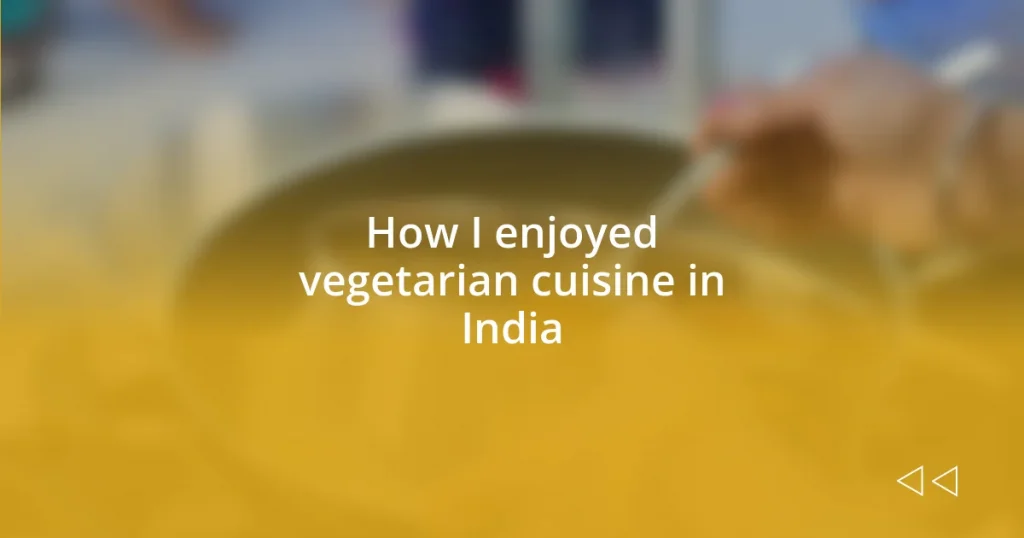Key takeaways:
- Vegetarian cuisine in India is deeply enriched by culture and tradition, showcasing a diverse array of flavors and dishes influenced by regional ingredients and age-old recipes.
- Choosing vegetarian options not only aligns with health benefits but also promotes environmental sustainability and fosters social connections through shared meals and experiences.
- Regional variations in vegetarian dishes across India reveal unique culinary identities, with personal experiences in local eateries highlighting the richness and warmth of Indian hospitality.

Introduction to Vegetarian Cuisine
Vegetarian cuisine is not just a dietary choice; it’s an experience rich with culture and tradition. During my travels in India, I discovered how deeply ingrained vegetarianism is in the local lifestyle, influenced by religious beliefs, regional ingredients, and age-old recipes. It’s fascinating to think: how does the absence of meat lead to such a diverse array of flavors and textures?
I recall one evening in a small village where I sat down for a meal prepared by a local family. The table was filled with vibrant dishes like paneer tikka, daal makhani, and fragrant biryani—each offering a distinct taste that danced on my palate. That moment turned into one of sheer joy, revealing the creativity that arises from simple ingredients when they’re prepared with love and care. Have you ever tasted something that made you appreciate the artistry behind the food?
What truly struck me was the emphasis on spices and fresh produce in vegetarian dishes. There was a sense of healthfulness in every bite, as if the meals were not just nourishing the body but also uplifting the spirit. It left me wondering how the world of vegetarian cooking in India had so much to offer, often overlooked by those unfamiliar with its richness.

Why Choose Vegetarian in India
Choosing vegetarian cuisine in India resonates with both cultural significance and health benefits. One of my favorite experiences was at a bustling street market in Jaipur, where the aroma of spiced samosas filled the air. I couldn’t help but wonder: what’s the secret behind the incredible variety found in vegetarian dishes? It’s clear that regional variations play a significant role, with each area showcasing its unique ingredients and flavors.
In addition to the diverse flavors, opting for vegetarian meals aligns with environmental consciousness. I remember discussing this with a local chef who shared how choosing plant-based dishes can reduce our carbon footprint. Reflecting on that, I felt a deeper connection to the food and the planet. Isn’t it amazing how food choices can impact both our health and the environment?
Moreover, vegetarian cuisine is often grounded in age-old traditions and rituals. During one festive occasion, I participated in a family feast that celebrated seasonal crops. The joy and unity felt during that meal were palpable, as each dish symbolized not just nourishment, but a connection to heritage. Can any meal compare to the richness of shared experiences around a table?
| Reasons to Choose Vegetarian | Dynamic Insights |
|---|---|
| Cultural Richness | Vegetarian dishes reflect regional diversity and traditions. |
| Health Benefits | Plant-based meals offer nutritional advantages for body and mind. |
| Environmental Impact | Choosing vegetarian can contribute to a more sustainable planet. |
| Social Connection | Meals often symbolize family and community ties, enriching experiences. |

Popular Vegetarian Dishes in India
When I think of popular vegetarian dishes in India, my mind races through a colorful tapestry of flavors. Each region adds its own flair, making every meal feel like a small celebration. One unforgettable evening, as I enjoyed a sizzling plate of chole bhature in a busy Delhi eatery, I was captivated by the perfect blend of spices that made the chickpeas sing. It was a moment of sheer delight, reminding me how simple ingredients can evoke such complex emotions and memories.
- Paneer Tikka: Marinated and grilled cottage cheese, usually served with vibrant mint chutney.
- Daal Makhani: A rich and creamy lentil dish, slow-cooked to perfection, often paired with naan.
- Dhokla: A steamed chickpea flour snack from Gujarat, light and fluffy, with a hint of sweetness.
- Palak Paneer: Spinach and cheese dish that mingles flavors beautifully, perfect with rice or bread.
- Vada Pav: A spicy potato fritter sandwiched in bread, a beloved street food resembling a vegetarian burger.
Another dish that left a lasting impression was the iconic biryani—a vegetarian version layered with fragrant spices and colorful vegetables. I remember sitting outside a humble eatery in Hyderabad as the sun set; the rich aroma wafted over, transforming the air into a feast itself. Each bite whisked me away on a journey through the spices, reminding me of the culinary stories woven through generations. Isn’t it remarkable how food can evoke such vivid memories and connections to culture?

Regional Variations in Vegetarian Food
Vegetarian cuisine in India showcases a remarkable tapestry of regional flavors, each with its own personality. For instance, I remember sampling a thali in Maharashtra, which featured a delightful assortment of dishes, from spicy bhaji to sweet modak. Don’t you think it’s fascinating how the same ingredient can take on different identities just based on where you are?
Traveling north to Punjab, I was welcomed by the irresistible aroma of saag and makki di roti. It struck me how food can carry the essence of its land; the mustard greens were fresh and vibrant, singing the praises of the fertile fields. Isn’t it incredible how local produce shapes culinary traditions? This experience truly emphasized that food is a reflection of geography and climate.
In South India, I found myself enchanted by the simplicity of a steaming bowl of sambar paired with fluffy idlis. The combination of flavors was a dance on my palate, embodying centuries of cultural history. While enjoying this dish, I wondered about the farmers and families behind those ingredients—what stories they must tell. That’s the magic of regional variations in vegetarian food; they narrate tales that connect us all, regardless of where we come from.

Must-Try Vegetarian Restaurants
One restaurant that truly stands out in my memory is Rajdhani Thali, where I indulged in an elaborate thali that felt almost like a culinary art piece. With every dish, from the tangy chutneys to the rich desserts, I felt a deep appreciation for the richness of Rajasthani cuisine. I can still visualize the vibrant colors arranged on the platter and the joy of sharing stories with fellow diners as we savored each bite—doesn’t it feel special when food not only nourishes but also brings people together?
In the bustling streets of Kolkata, I stumbled upon Bergg Cafe, known for its creative vegetarian fusion dishes. I had the chance to try their Bengali Pitha Pizza, a unique take blending traditional rice cakes with classic pizza toppings. The experience was exhilarating; each mouthful was a vibrant reflection of the city’s lively spirit. It’s amazing how restaurants like this can take cultural inspirations and transform them into something utterly delightful—have you ever tried a dish that challenged your expectations?
Another gem is Saravana Bhavan, a South Indian chain that serves up idlis and dosas that transport you straight to the heart of Tamil Nadu. I remember visiting late one afternoon, the room bustling with laughter and the aroma of freshly ground spices. There’s something soul-soothing about sharing a hot plate of crispy dosas with a side of coconut chutney— it’s a meal that warms your heart. Doesn’t it remind you how certain meals can bond strangers over shared tastes and memories?

Tips for Finding Vegetarian Options
When I’m searching for vegetarian options, I always look for local eateries rather than international chains. I remember wandering through the vibrant markets of Jaipur, where I discovered a tiny street stall selling mouthwatering aloo tikki chaat. It was a delightful revelation that street food offers some of the most authentic flavors. Have you ever stopped to consider how these hidden gems can provide a genuine taste of culture that a formal restaurant might lack?
I also recommend using vegetarian food apps or websites. One time, while exploring Bangalore, I turned to an app that led me to a cozy café nestled away from the main roads. The reviews praised their innovative twists on traditional dishes, and boy, were they right! When was the last time you found something extraordinary purely by chance? Technology can truly enhance our food experiences, opening doors to eateries we might not find in a guidebook.
Lastly, don’t hesitate to ask locals for recommendations—they’re often the best resource. I recall chatting with a friendly shopkeeper in Varanasi who pointed me toward a family-run restaurant famous for their baida roti. The warmth in his voice as he described the dish made me curious to try it. Isn’t it fascinating how personal stories can guide us to unforgettable meals? Engaging with locals not only leads to delicious discoveries but also enriches our travel experience by connecting us to the community.

Personal Experiences and Recommendations
One of my most memorable vegetarian meals was at a small family-run restaurant in the hills of Darjeeling. As I sat at a wooden table overlooking the verdant landscape, I was served a steaming bowl of momos filled with fresh vegetables and herbs. Each bite was a burst of flavor, and the warmth of the dish mirrored the heartwarming hospitality of the locals. Isn’t it amazing how food can evoke such powerful emotions and create a sense of belonging, even when you’re miles away from home?
I also discovered the joys of vegetarian thali in a vibrant eatery in Mumbai. The waiter seemed genuinely excited as he described each component of the meal, from the tangy sambhar to the vibrant vegetable side dishes. By the end of the meal, not only did I feel stuffed, but I also felt like I had experienced a slice of Indian culture. Have you ever noticed how certain meals can transport you to another world through flavors and stories?
One experience that stood out was sharing a meal during a local festival in a small village. The community came together, and I was invited to join them in enjoying traditional vegetarian dishes prepared with love and care. The laughter and conversation were hearty, just like the food. It made me reflect on how food is so much more than just sustenance; it’s a way to bring people together. Don’t you think that food shared with others adds an extra layer of enjoyment and richness to the experience?















